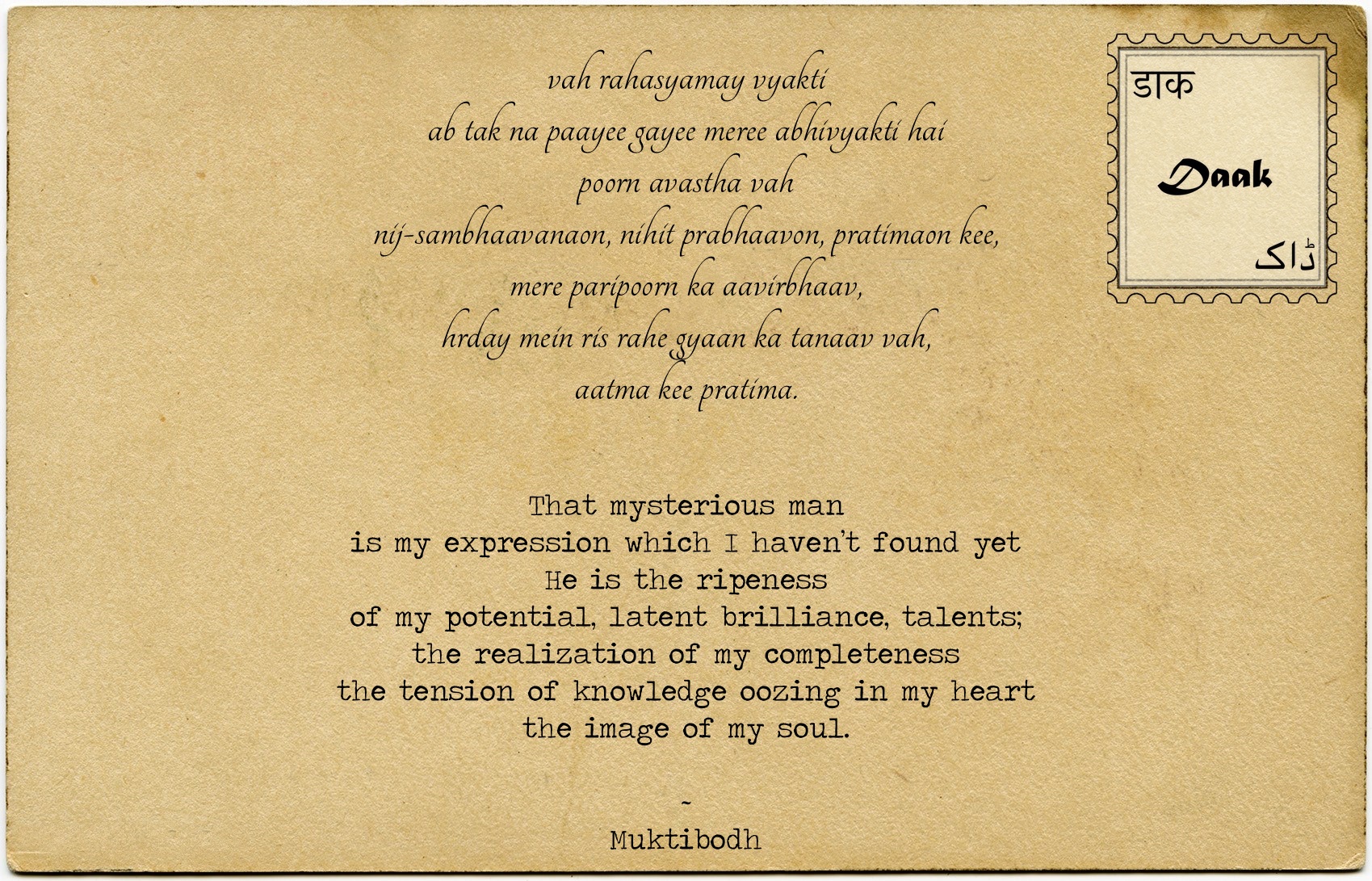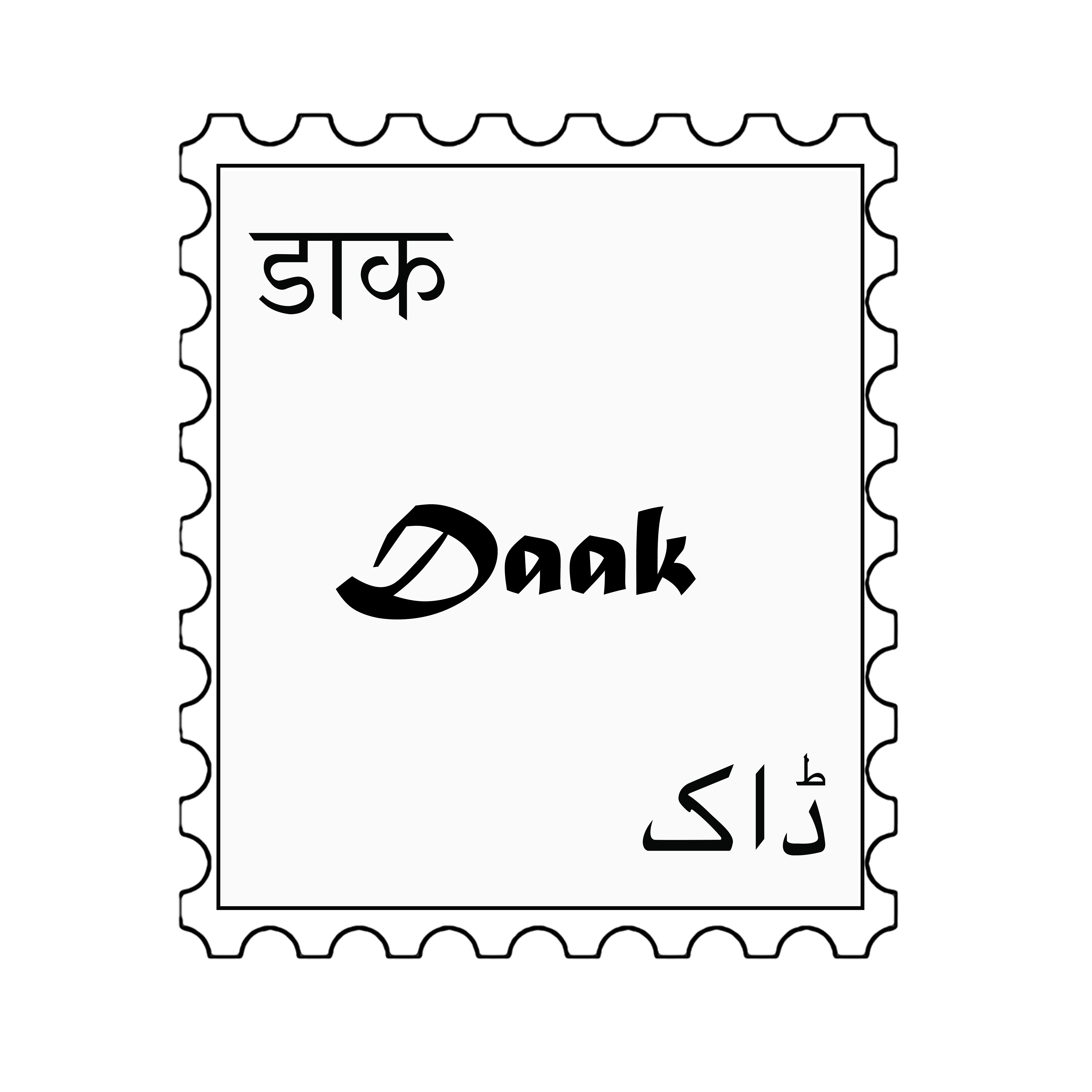
The Ultimate Expression: Muktibodh’s Poem, Andhere Mein
Gajanan Madhav Muktibodh (1917 – 1964) was a Hindi poet and writer, most prominently known as one of the pioneers of modern Hindi poetry. His short life was full of idealism and intellectual rigour, and an equivalent struggle for survival. Even though Marxist ideology and existential thought filled his creative output, his daily life was fraught with financial insecurities and frequent job changes as he worked to provide for his family. Unfortunately, Muktibodh died before he could get his poems published as a book.
One of his final poems–also the longest one–Andhere Mein (In the Dark) is a wide canvas that Muktibodh has used to sketch surrealist imagery, filled with social commentary and profound meditation on the soul and its expression. Although outwardly a criticism of state power in the Nehruvian era in India, it is difficult to impose a single theme onto the full poem. While the complete poem covers a large canvas of socio-political history in India, the excerpts we have chosen speak of the individual human experience. Here, we see Muktibodh draw on his personal tragedies to seek an ideal, the ultimate expression and fulfillment of man’s lost identity.
This allegory–if one looks carefully–offers a lesson, even inspiration, to the reader. It serves to remind us of the existence of an unstoppable life force within ourselves and puts forth a path for a lifelong quest, albeit one that is hard and full of trials. When full of self-doubt and difficulty, this poem serves as a wise reminder for belief in a vast, untapped potential within us.
(…) the ripeness
of my potential, latent brilliance, talents;
the realization of my completeness
the tension of knowledge oozing in my heart
the image of my soul.
Here is a short excerpt from the longer poem:
Andhere Mein
zindagi ke…
kamron me andhere
lagaata hai chakkar
koi ek lagaataar;
aawaaz pairon ki deti hai sunai
baar-baar… baar-baar,
vah nahi dikhta… nahin hi dikhta,
kintu vah raha ghoom
tilasmi khoh mein giraftaar koi ek,
bheet-paar aati hui paas se,
gahan rahasyamay andhakaar dhvani-sa
astitva janaata
anivaar koi ek,
aur mere hriday ki dhak-dhak poochti hai – vah kaun
sunayi jo deta, par nahi deta dikhayi !
itne me akasmaat girte hain bheetar se
phoole hue palastar,
khirtee hai choonay-bhari ret
khisakti hain papdiyaan is tarah –
khud-ba-khud koi bada chehra ban jaata hai,
svayamapi
mukh ban jaata hai divaal par,
nukeeli naak aur bhavy lalaat hai,
dridh hanu
koi anajaani an-pehchaani aakriti.
kaun vah dikhayi jo deta, par
nahi jaana jaata hai !
kaun manu ?…
vah rahasyamay vyakti
ab tak na paayi gayi meri abhivyakti hai
poorn avastha vah
nij-sambhaavanaon, nihit prabhaavon, pratimaon ki,
mere paripoorn ka avirbhaav,
hriday me ris rahe gyaan ka tanaav vah,
aatma ki pratima.…
vah mere paas kabhi baitha hi nahi tha,
vah mere paas kabhi aaya hi nahi tha,
tilasmi khoh me dekha tha ek baar,
aakhri baar hi.
par, vah jagat ki galiyon me ghoomta hai pratipal
vah phatehaal roop.
tadittarangi vahi gatimayta,
atyant udvign gyaan-tanaav vah
sakarmak prem ki vah atishayata
vahi phatehaal roop !!
param abhivyakti
lagaataar ghoomti hai jag me
pata nahi jaane kahaan, jaane kahaan
vah hai.
isliye main har gali me
aur har sadak par
jhaank-jhaank dekhta hoon har ek chehara,
pratyek gatividhi
pratyek charitra,
va har ek aatma ka itihaas,
har ek desh va raajanaitik paristhiti
pratyek maanviya svaanubhoot aadarsh
vivek-prakriya, kriyagat parinati !!
khojta hoon pathaar… pahaad… samundar
jahaan mil sake mujhe
meri vah khoyi hui
param abhivyakti anivaar
aatm-sambhava.
In the dark
In life’s…
dark chambers
someone is pacing up and down
ceaselessly;
I can hear the sound of his steps
again and again…again and again
I cannot see him…cannot see him
but he goes on wandering
Someone arrested in an enchanted cave
Someone unstoppable
asserts his existence
like the echo of deep mysterious darkness,
resounding nearby, behind the wall.
And the beating of my heart
asks – Who is he
that I can hear, but cannot see?
Then bulging plaster
suddenly falls from the wall
Sand full of lime cracks
Flakes slip
a big face emerges
of its own accord
A silhouette appears on the wall –
Pointed nose,
magnificent brow,
firm chin;
An unknown unfamiliar shape.
Who is he
that I can see, but
cannot know!
Manu?…
That mysterious man
is my expression which I haven’t found yet
He is the ripeness
of my potential, latent brilliance, talents;
the realization of my completeness
the tension of knowledge oozing in my heart
the image of my soul.
…He never sat next to me,
never even came to me,
once I saw him in an enchanted cave
it was the last time!
But he walks the lanes of this world ceaselessly
in tattered clothes
at the speed of lightning
He – anxious tension of knowledge,
abundance of vigorous love
in tattered clothes!
My ultimate expression
wanders in the world ceaselessly
I don’t know where he is
Who does?
So I scrutinize every face
on every lane
and every street,
all actions,
all deeds,
the history of every soul,
every country, political situation and circumstance
every human self-perceived ideal,
the process of discrimination, the active transformation!
I search plateaus … mountains… oceans
where I might find
my lost
ultimate expression,
unstoppable
self born.
Excerpts taken from the book New Poetry in Hindi. Read the full poem in Hindi here

Leave a Reply